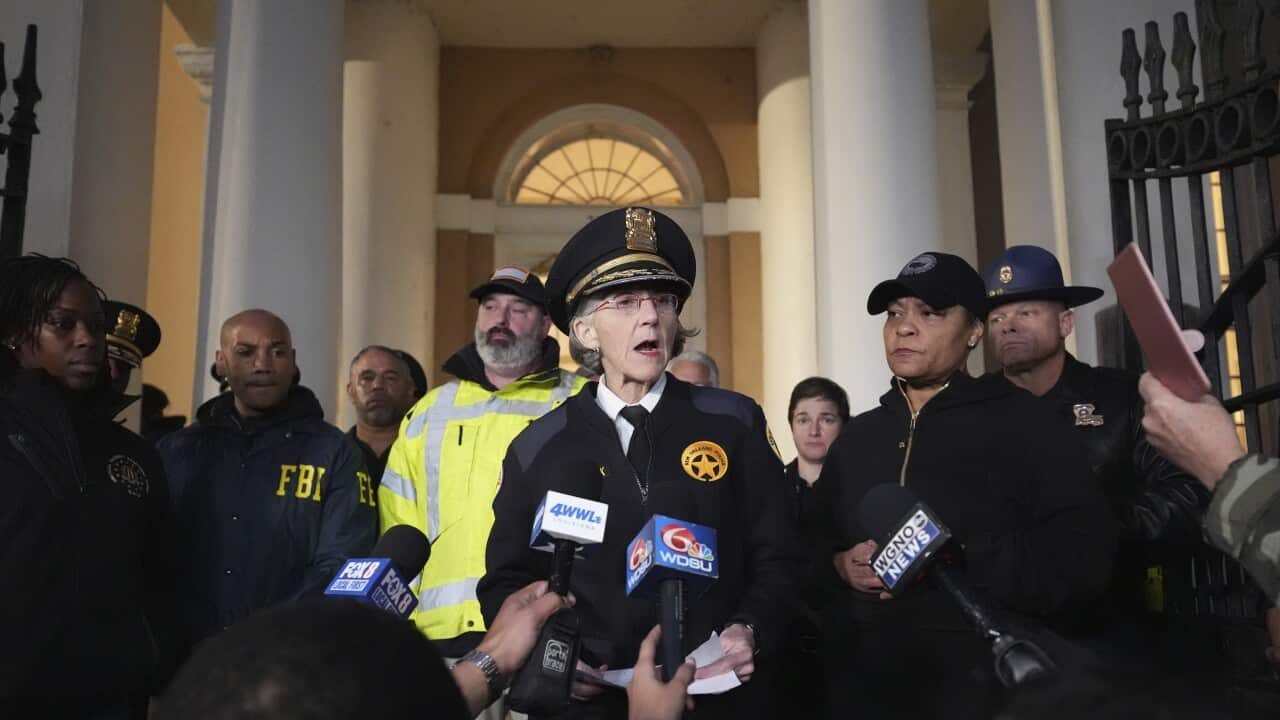English
"My name is Raoul. I'm the creator of the Weapon of Mass Instruction, which is a sculpture that has the ability of transporting books, giving books away, collecting books, making a mess of people's heads. Of my head too, also."
That's the creator of the Weapon of Mass Instruction.
It's a mobile library in Argentina, made to look like a tank and fitted with shelves full of books.
For Charles Sturt University information studies academic Dr Jane Garner, it's proof that mobile libraries can be found all over the world, in all shapes and sizes.
Australia is no exception.
"On the biggest scale there are like huge articulated trucks that are fitted out with shelves and seating areas and computer terminals and beanbags, carpet on the floor - just like a small library building but it's on wheels - right down to much smaller arrangements where you've got maybe like a small van which has got sides that open up. People come - go into the van. They walk out to the outsides of the van, the sides will come up. They'll become like a little roof space or a little verandah, and all the shelves are on the outsides of the van, and people interact with the collections and the internet from the outside of the van."
Trish Hepworth is from the Australian Library and Information Association.
She says mobile libraries are relatively common on the east coast of Australia, especially in New South Wales.
"Just to give you sort of an idea of the scale, there are 28 mobile libraries in New South Wales. They service about 422 remote communities, or regional communities... They service an awful lot of people."
Trish Hepworth says one of the longest-lasting services is in the western Sydney suburb of Parramatta, with their mobile library beginning two years after the end of the Second World War using surplus items from Australia's Air Force.
"It (the surplus) was converted into all sorts of things, but my favourite conversion is converting it into libraries. And into that RAAF workshop truck they managed to get 1200 children's titles and 1200 adult titles. And so that's a huge amount of reading material that could then go out."
Mobile libraries are also commonplace in Victoria.
A number of regional cities and towns have well-established services but new ones are still being added on a regular basis.
On the Mornington Peninsula, south-east of Melbourne, plans are well underway to bring back its mobile library that had been suspended because of COVID.
But urban centres also have seen the value in mobile libraries.
The City of Melbourne introduced its book mobile - affectionately known as the Mel-van - in 2022.
Lord Mayor Sally Cap says it's designed to reach a range of under-served groups, such as culturally and linguistically diverse communities, elderly and disabled residents, and rough sleepers.
"We regularly visit places that we know are used by people like the North Melbourne Language and Learning Centre, like the Kensington Neighbourhood Centre, like our South Yarra Senior Citizens Centre. We know from our own data that many of those people may not be currently accessing our libraries, and this gave us a chance to take the service to them."
Dr Jane Garner says libraries have survived - and thrived - despite financial pressures and the rising cost of living precisely because they play such an important role in community life.
She says their positive impact is why they will always be so desperately needed.
"If you walk into a library on any given day, you'll see parents with young children, you'll see older people hanging out together, maybe knitting groups, maybe reading clubs. There'll be kids in there doing occupational therapy sessions with their OT. There'll be families in there, multi-generational families hanging out, grandkids with their grandparents. It's the only place in our communities really where people can go without having to pay money and just to spend time, to learn, to read, to see what's going on in their communities. Mobile libraries do all those things as well. They just come to the people rather than the people having to come to them."
Italian
"My name is Raoul. I'm the creator of the Weapon of Mass Instruction, which is a sculpture that has the ability of transporting books, giving books away, collecting books, making a mess of people's heads. Of my head too, also."
Questo è il creatore di Weapon of Mass Instruction, Arma di istruzione di massa.
Si tratta di una biblioteca mobile in Argentina, costruita in modo da sembrare un carro armato e riempita di scaffali colmi di libri.
Per la dottoressa Jane Garner, accademica in Scienze dell’informazione della Charles Sturt University, questo è prova del fatto che le biblioteche mobili si trovano in ogni parte del mondo, in tutte le forme e dimensioni.
E l’Australia non è un’eccezione.
"On the biggest scale there are like huge articulated trucks that are fitted out with shelves and seating areas and computer terminals and beanbags, carpet on the floor - just like a small library building but it's on wheels - right down to much smaller arrangements where you've got maybe like a small van which has got sides that open up. People come - go into the van. They walk out to the outsides of the van, the sides will come up. They'll become like a little roof space or a little verandah, and all the shelves are on the outsides of the van, and people interact with the collections and the internet from the outside of the van."
Trish Hepworth lavora per la Australian Library and Information Association.
Secondo lei, le biblioteche itineranti sono abbastanza comuni nella costa est australiana, specialmente in New South Wales.
"Just to give you sort of an idea of the scale, there are 28 mobile libraries in New South Wales. They service about 422 remote communities, or regional communities... They service an awful lot of people."
Hepworth sostiene che una delle più longeve biblioteche mobili si trova a Parramatta, quartiere ad ovest di Sydney, dove la biblioteca venne inaugurata due anni dopo la fine della Seconda Guerra Mondiale, usando le rimanenze dell’aviazione australiana.
"It (the surplus) was converted into all sorts of things, but my favourite conversion is converting it into libraries. And into that RAAF workshop truck they managed to get 1200 children's titles and 1200 adult titles. And so that's a huge amount of reading material that could then go out."
Le biblioteche mobili sono comuni anche in Victoria.
Non poche città e cittadine dell’entroterra godono di servizi ben radicati, a cui si stanno aggiungendo regolarmente delle nuove biblioteche.
Nella Mornington Peninsula, a sud-est di Melbourne, il piano di ripristinare la biblioteca mobile, sospeso a causa del COVID, è a buon punto.
Ma il valore delle biblioteche mobili è percepito anche nei centri urbani.
La municipalità di Melbourne ha introdotto la propria biblioteca mobile – affettuosamente conosciuta come Mel-van — nel 2022.
La sindaca Sally Cap ha detto che Mel-van è progettata per raggiungere una fascia di gruppi poco serviti, come le comunità culturalmente e linguisticamente diverse, gli anziani e i disabili, oltre ai senzatetto.
"We regularly visit places that we know are used by people like the North Melbourne Language and Learning Centre, like the Kensington Neighbourhood Centre, like our South Yarra Senior Citizens Centre. We know from our own data that many of those people may not be currently accessing our libraries, and this gave us a chance to take the service to them."
La dottoressa Jane Garner sostiene che le biblioteche siano sopravvissute – se non prosperate – nonostante le pressioni finanziarie e il crescente costo della vita, proprio per il loro ruolo cruciale che rivestono nella vita delle comunità.
Garner ha detto che il loro impatto positivo è il motivo per il quale ce ne sarà sempre un gran bisogno.
"If you walk into a library on any given day, you'll see parents with young children, you'll see older people hanging out together, maybe knitting groups, maybe reading clubs. There'll be kids in there doing occupational therapy sessions with their OT. There'll be families in there, multi-generational families hanging out, grandkids with their grandparents. It's the only place in our communities really where people can go without having to pay money and just to spend time, to learn, to read, to see what's going on in their communities. Mobile libraries do all those things as well. They just come to the people rather than the people having to come to them."




